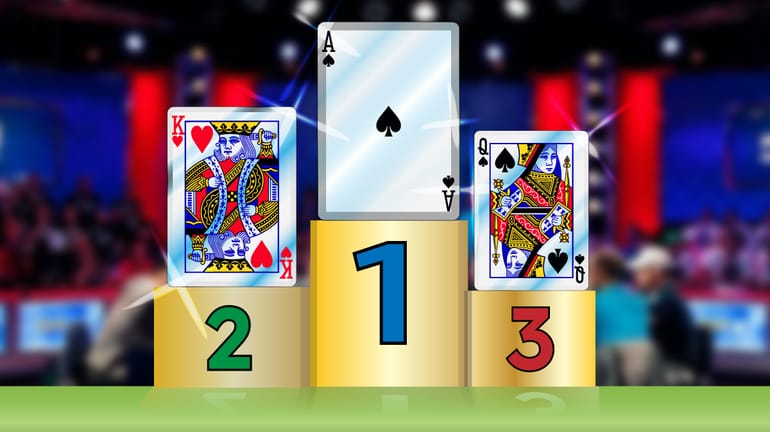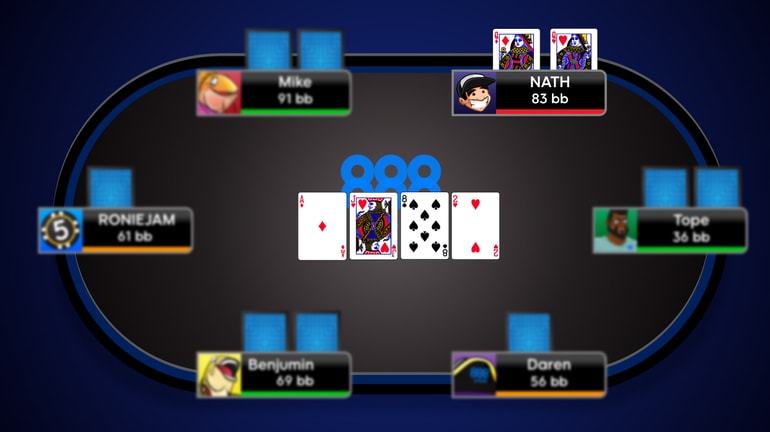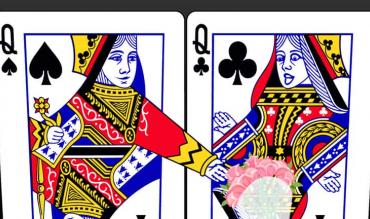As the third-best starting hand in poker, players should delight in being dealt two ladies in the hole. This hand is almost always worth a decent raise or three-bet to test the strength of opponents’ hands and build a pot.
Q-Q can help a player at almost any time in a tournament or cash game. Undoubtedly, this is a premium hand, but an Ace or a King on the flop, turn, and river can cause a player to slow down.
Here are some ideas on what players might consider when playing pocket Queens:
- A dry board may require a nice-sized bet to chase away any stragglers in the pot who missed or extract some chips from those who may have picked up top or middle pair.
- An Ace or a King on the flop may encourage some players to slow down with Q-Q. But considering other players’ positions, hand ranges, and the board, many players may want to continuation bet. But beware of an opponent’s raise.
- Paying attention to a player’s table reputation may also help when playing this hand. You might play differently if a very tight player three-bets you versus if an aggressive player four-bets you.
Regarding this last idea, 888poker ambassador offers some insight.
“If you are deep-stacked and you open raise with Q-Q in early position in a full ring game and a very tight player three-bets you,” she says, “you can consider just calling to keep worse hands in the pot and not commit yourself to lose a full stack versus King-King or Ace-Ace.”
Playing these types of big hands well can undoubtedly benefit your game, and it’s ideal for maximising the value of value you get out of them.
Table of Contents
- Why are Pocket Queens Called “Ladies”?
- How Often Do Pocket Queens Win?
- How to Play Pocket Queens Preflop
- Can you fold Pocket Queens Preflop?
- Pocket Queens: All-in
- When To Fold Pocket Queens?
- Bet Sizing Advice with Queens
- General Considerations to Make To Decide When To Fold Queens
- How to Beat Pocket Queens
- Strategy: How To Play Queens on an Ace-High Flop
- Pocket Queens Summary
Why are Pocket Queens Called “Ladies”?
This hand nickname is fairly obvious. The four Queens are the only female face cards in the deck. “Lady” has a historical sense of nobility, but the term can also simply refer to a woman in general. Players are happy to see these ladies coming their way.
How Often Do Pocket Queens Win?
Pocket Queens is a powerful hand – a heavy favourite to win against any random two cards, but also bringing concerns when an Ace or a King hit the board. More players in a pot can alter the hand’s strength with the chance of them catching straights, flushes, and even trips.
Also, of note, attempting to trap preflop can result in very dangerous situations. If there is no preflop raising, more hands with Aces or Kings may end up seeing a flop also. There’s a 40 percent chance one of those two cards will hit the board.
Because of that percentage, moving all-in with Q-Q can also present a dicey situation. Undoubtedly, it’s a premiere hand, but may not be worth big moves, depending on the timing in a tournament. A player on a short stack, however, should be ready to get those ladies all-in.

“In 100-big blind cash games you will see more flops, compared to a tournament – where stack sizes are more shallow,” Lovgren notes. “For example, four-betting and five-betting appear more in cash games than tournaments because of the stack sizes.
“In general, you’ll be all in with Q-Q more often preflop in tournaments because of more shallow stacks, compared to a full ring cash game where the effective stacks are usually always 100 to 200 big blinds. You’ll be able to just call a four-bet with it, and still have chips behind and play post-flop.”
Pocket Aces or Kings vs Queens
If you do end up in a situation facing another player with pocket Kings or Aces, it’s probably not going to end well. Those two hands are about 80 percent favourites over Q-Q.
If those hands have matching suits, such as Q♥Q♦ versus K♥K♦, the winning odds go up to 82.35 percent. The pocket Kings or Aces would be in great shape in this situation.
Pocket Queens vs Ace-King Odds
A pair of ladies performs pretty well against Big Slick but winning against A-K isn’t a certainty. When Q-Q goes up against A-K before the flop, there is a 57 percent chance the Queens hold up.
That goes down to 54 percent against suited A-K. Queens are a bit greater than a coin-flip but beware of Big Slick.
Pocket Queens vs Ace-Queen or Ace-Jack
These are excellent matchups for those pocket Queens. Facing A-Q off-suit, pocket Queens have slightly more than 69 percent to win. If a Queen hits the board, that A-Q is in big trouble. Even if you face A-Q suited, that percentage would only fall to about 65 percent.
A-J has it even tougher when facing pocket Queens – with those ladies a 71.3 percent favourite. A suited A-J only drops that to 67.57 percent. Players should feel good when up against this hand – just pray those three Aces stay hidden in the deck.
How to Play Pocket Queens Preflop
You should raise preflop with pocket Queens. Players will want to isolate and avoid large multi-way pots. A larger number of opponents will help ensure your hand goes down to one of the weaker callers.
Another thing to consider is bet sizing. Players may want to choose more substantial raises to maximise value against those with weaker calling hands such as J-J, 10-10, 9-9, etc.
Is it ever acceptable to limp with Q-Q preflop?
In most scenarios, whether in early, middle, or late position, players will want to raise. That includes three-betting to show strength and deter others from entering the pot. When facing four-bets, players will have some decisions to make regarding these opponents, their betting and playing style, and whether to call or put in another bet.
Is it ever acceptable to call with Q-Q preflop after an open/3bet/4bet?
As noted above, players facing three- and four-bets with Q-Q have some decisions to make about opponents and their holdings. A player sensing opponents with weaker hands might get some value by simply making a call at this point.
“In some scenarios, it might be good to just flat call,” Lovgren says, “since a tight player might fold 10-10 and Jack-Jack to another big raise preflop – and you could be in trouble versus King-King and Ace-Ace. You could trap and get it in on a low board.”
Can you fold Pocket Queens Preflop?
While it may not be easy, getting away from Q-Q is possible and a necessary play at times. Obviously after raising preflop, seeing an Ace or a King on the board should give a player some pause.
Facing raises or major bets on this flop will have a player considering a fold. If both an Ace and a King hit the felt, a fold becomes even more likely.
Preflop folds may be more difficult, but Lovgren offers some advice to consider in these situations.
“When an extremely tight player four-bets you, you need to spend some extra time thinking and even fold them,” she says. “If you get a lot of resistance post-flop, don’t fall in love with the hand. If the flop comes 7-8-9 and someone raises you a lot, you need to be careful and be ready to let it go.”
Pocket Queens: All-in
Undoubtedly, players on shorter stacks in tournaments or even cash games will consider moving all-in with this hand. It offers plenty of value in that situation and has an excellent chance of doubling up – especially if a player has enough chips for some fold equity against marginal hands.
When To Fold Pocket Queens?
Consider player type when weighing up a fold -
Has this opponent been tight or aggressive?
Should I simply call a three-bet and get a look at the flop?
Also, board texture will be a significant consideration. Someone with Q♥Q♦ may be reluctant to invest much into a flop with all spades. If one of those cards is an Ace or a King, that makes continuing even more difficult.

Look for similar situations to consider a player’s range with boards where straights are possible. A paired board can also be a sign to slow down if you think your opponent has hit trips.
Bet Sizing Advice with Queens
In general, it is advised to avoid trapping preflop and use larger bets to remove other players from the field. Early position players may want to bet larger to show some strength and get out marginal hands.
A player in late position will be raising as well even with a player already putting in a raise ahead of him. After the flop, a third Queen on the board may offer some opportunity at a big payday. Players may consider check-raising to trap an opponent or a smaller bet to keep an opponent in the pot and help maximize returns on those trips.
In his autobiography and strategy book Moorman, 888poker Ambassador spotlights a hand he played in the 2014 L.A. Poker Classic when he held Q♠Q♣ on the small blind. With blinds at 30,000/60,000 and the action folding around the table, a player on the button named Rocco raised to 160,000. Moorman chose to reraise to 460,000.
Rocco, who held 2♠2♥ called, and the flop came 3♠10♥7♣. This board put Moorman seemingly in good shape, but he admits to a move that can be costly in this situation – allowing an opponent to see a free card.
“I elected to check, which I don’t like at all with Queens,” Moorman recalls. “Allowing him to take a free card with a hand such as King-Jack or Ace-x is a disaster and, given the stack sizes, he might not stab here as often as he would if they were reversed.”
Rocco indeed checked behind and the turn brought the 9♦. Moorman bet 455,000 and faced a big reraise to 1.5 million. No longer sure of where he was in the hand, Moorman called and then saw an A♥ on the river. After checking, Rocco bet 1.8 million. That was too much, and Moorman folded.
He noted what many might feel after slow-playing Q-Q:
“I think I tried to get too fancy in this spot - going for a check-raise.”
General Considerations to Make To Decide When To Fold Queens
There are some criteria to consider when folding pocket Queens. While it may take some in-depth reads and intuition, players can make the right choice if they pay attention and watch how the hand plays out.
Here are a few things to watch and consider:
- An opponent’s previous playing style – An aggressive player might be willing to call with inferior hands. Big raises from more conservative players might cause a player with Q-Q to hit the brakes.
- Cards on the board –Aces and Kings can be harmful and well as cards with possible straight and flush draws.
- Consistent aggression from an opponent during the hand – Calling may be better than raising considering these above or even dumping the hand altogether.
How to Beat Pocket Queens
Obviously, stack sizes will be taken into consideration when calling a player with a big hand like pocket Queens. A player on a small stack would be called more often than those with a sizable number of chips. A player might call with a hand like A-10 and get lucky hitting an Ace.
Suited connectors can also be lucrative against a premium hand like Q-Q. A player may be looking to take a “low line” in hopes of snapping off an opponent.
Strategy: How To Play Queens on an Ace-High Flop
Seeing an Ace or a King on the flop doesn’t mean all is lost. It’s essential to remember that a player holding any two cards has only a 29 percent chance of hitting a pair. And that doesn’t mean top pair.
Players have two options:
- Check on the flop and see what an opponent does next. A player will then have to decide whether it’s worth calling a bet. Players with inferior hands may still take a stab at the pot. An opponent also checking behind offers a player with Q-Q the opportunity to possibly bet on the turn and river with a pretty confident feeling that those Queens might be good.
- Bet out with a small amount to see how your opponent reacts. A raise might offer some insight into what he might be holding. Those players still may not have an Ace, but that raise notes that it’s time to take caution.
Pocket Queens are a strong starting hand, but an Ace (or even a King) on the board can present problems. If an opponent is showing some strength, it may be time to dump those Queens.
If you sense weakness, however, an opponent with J-J, 10-10, or something similar may also find himself in a tight spot facing a bet or raise. A solid read might lead to raking that pot.
Pocket Queens Summary
Pocket Queens are usually gold for players. This premium hand offers a shot at a decent pot. However, they are much more beatable than K-K and A-A. An Ace or King (or worse, both) on the board can be trouble.
Bet those pocket Queens preflop and continue if a King or an Ace don’t hit the board. Those ladies can be profitable in the long run.


